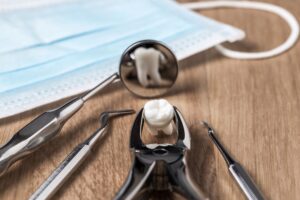
Although your dentist usually does everything they can to protect and preserve your teeth, there are times when an extraction is better for your oral health. If you have a severely decayed, broken, or infected tooth, it could impact your jawbone and gums if it’s left untreated. You might also need to have a tooth removed to make room for orthodontic treatment or dentures.
It’s normal to feel anxious, but rest assured; your provider wouldn’t recommend this path if they didn’t feel it was the best way to safeguard your smile. Continue reading to learn more about 3 of the advantages of having teeth extracted so you can set your mind at ease!
Benefit #1: Pain Relief
If you’ve been suffering from a terrible toothache that wouldn’t subside, there’s a good chance that it’s infected. Cavities, chips, and cracks in your teeth allow bacteria to penetrate the tender nerves and tissues inside. This can cause a painful infection that won’t go away on its own. Sometimes, an emergency root canal can remove toxic materials and restore your tooth’s functionality. However, if it’s too injured to be saved, then extracting it is the best way to address the source of your discomfort.
Don’t worry; we’ll apply a local anesthetic first to keep you comfortable. It’s normal to have some mild aches and inflammation afterward, but typically, they dissipate after a few days.
Benefit #2: Prevent Problems
Removing an infected tooth can also improve your overall health because the disease can impact your jawbone and gums, too. It might spread to your remaining teeth or contribute to gum disease. From there, it can enter your bloodstream and contribute to other medical conditions like diabetes or heart issues. That means having a problematic tooth extracted can boost your general well-being in addition to your oral status.
Benefit #3: Eliminate Overcrowding
Sometimes, teeth need to be removed to prevent issues that result from overcrowding. If your teeth are so packed together that they overlap, it’s harder to reach all the surfaces to brush and floss them thoroughly. Not only does this impact your dental condition, but it can also leave you feeling self-conscious about your appearance.
In these instances, certain teeth may be pulled so there’s enough room for them all in your mouth. Then, your dentist might recommend an orthodontic solution like Invisalign to shift them back into their rightful places.
Understanding how a tooth extraction helps can provide some well-deserved peace of mind about your upcoming procedure!
About the Author
Dr. Aliana Henkin has 15+ years of experience helping people improve their lives by enhancing their dental condition. She earned her doctorate at the Rutgers School of Dental Medicine, with a particular focus on cosmetic and restorative dentistry, dental implants, and oral surgery. If you have an injured or aching tooth, she’s an expert who can provide individualized solutions to help. She has the advanced training and state-of-the-art equipment to perform certain surgical procedures in the office, including extractions. If you need an appointment, you can request one on the website or call (973) 949-0925.
